Managing your health after retirement
During your working years, your employer and the Health Insurance Society will provide opportunities to get health examinations and complete checkups, as well as to engage in health activities intended to help you manage and improve your health.
After retirement, however, much of the responsibility for managing your health will shift to you.
This page introduces some points to note for maintaining your health and avoiding disease.
Changes in physical condition and risk of disease by age group
Health changes with age. To stay in good health, it's important to understand how your body and the risk of disease change with age.
20s-30s |
People in this age group typically have high basal metabolism as well as physical strength and resilience. But poor lifestyle habits during these years can lead to future health risks. Be careful with lifestyle habits like lack of sleep, poor diet, lack of exercise, stress, excessive drinking, and smoking. |
|---|---|
40s-50s |
During these years, basal metabolism declines, while body fat increases. The risk of conditions like diabetes, high blood pressure, and dyslipidemia increases. Stress is another risk factor that can lead to mental health issues. Women may experience menopausal symptoms. |
60s |
The risk of heart disease, cerebrovascular disease, and cancer increases. In addition to diminishing cognitive function, the risk of falls due to diminished motor function and bone fractures due to lower bone density increases. |
70s and later |
As declines in physical strength and sensory function become noticeable, look for signs of frailty and sarcopenia (see below). Weaker immune function also increases the risk of infectious diseases. |
Conditions that require special attention and countermeasures
The risk of various conditions grows with age. It's important to address the following conditions early:
Cancer, lifestyle-related conditions
Lifestyle habits like poor diet, lack of exercise, lack of sleep, drinking, and smoking is said to lead to the development of these conditions.
It's important to eat a balanced diet, to exercise regularly, and to avoid excessive drinking and smoking.
Cancer
Cancer is the most common cause of death in Japan. The risk of cancer increases with age.
But people can get cancer at any age. Among women, the risk of cervical cancer begins to increase in the 20s, while the risk of breast cancer begins to increase in the 30s.
High blood pressure, diabetes, dyslipidemia
These conditions have few subjective symptoms. If they progress, they can lead to stroke, heart attack, and other life-threatening conditions.
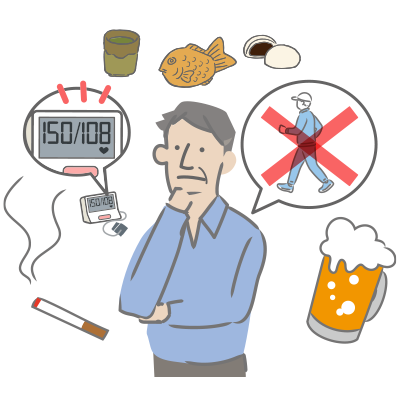
Locomotive syndrome
This refers to a decline in motor function attributable to weaker muscles and bones.
Left untreated, it can make it more likely individuals will eventually require long-term care or become bedridden.
The key to prevention is to continue doing moderate exercises like standing on one leg and squats.
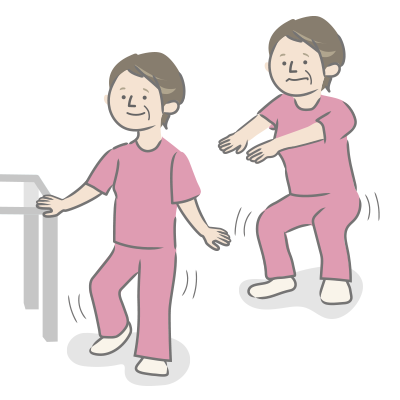
Sarcopenia
This refers to the age-related loss of muscle mass and strength.
It can affect basic movements like standing up and walking. Left untreated, it can lead to difficulty walking.
Effective ways to counter sarcopenia include proper nutrition (in particular, adequate protein intake) and strength training.

Frailty
This refers to the intermediate state between being healthy and requiring long-term care, resulting from age-related declines in physical functions.
Frailty has three aspects: physical frailty, including locomotive syndrome and sarcopenia; mental and psychological frailty, including depression and mild dementia; and social frailty, a condition in which social interaction declines significantly.
It's important to eat well, move well, and participate actively in society.
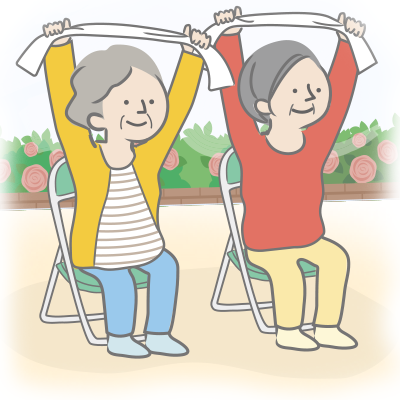
Osteoporosis
This is a condition in which bone density declines with age, making bones weaker and more susceptible to fractures.
In particular, bone density in women declines rapidly after menopause. Be sure to get enough calcium and vitamin D and to maintain a habit of moderate exercise.
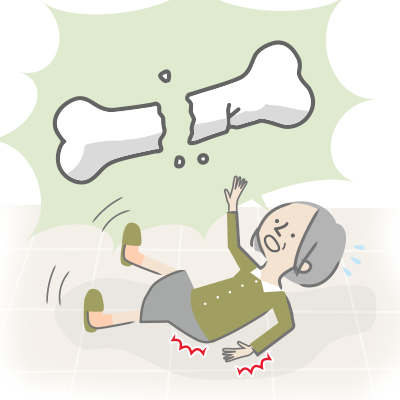
Dementia
This is a condition in which daily life is affected by impairments in cognitive functions like memory, judgment, and language ability, due to various factors such as brain disease or injury.
Early countermeasures, like getting a balanced diet, regular exercise, social interaction, and cognitive training at specialized institutions, are important.

Eye disease (e.g., cataracts, glaucoma, age-related macular degeneration)
Worsening eyesight and narrowing field of vision can increase the risk of falls and accidents.
In particular, cataracts, glaucoma, and age-related macular degeneration pose the risk of blindness. Get your eyes checked regularly to detect these conditions early.
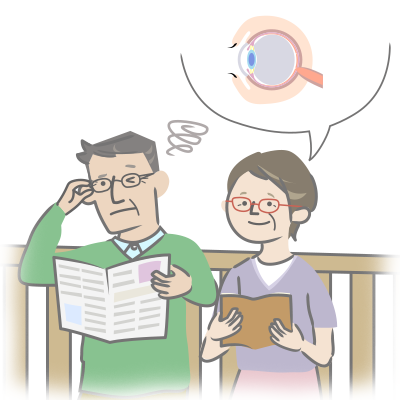
Periodontal disease
It is said that the risk of periodontal disease grows with age.
Periodontal disease is a risk factor for various other conditions, including diabetes, arteriosclerosis, osteoporosis, and aspiration pneumonia.
Daily brushing and regular dental checkups are vital.
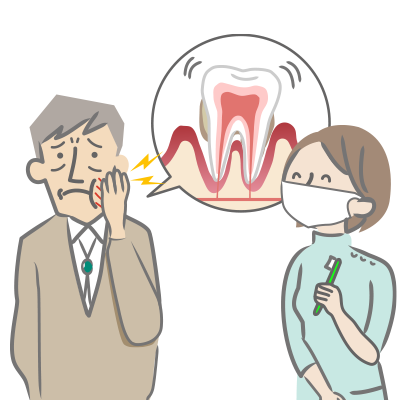
Review and improve your lifestyle habits.
The daily rhythms of life are prone to change after retirement, disrupting your diet or making it harder to get enough exercise. Keep the following points in mind to stay in good health:

Eat three balanced meals daily, with the right balance of carbohydrates, proteins, vitamins, and minerals. Avoid too much salt.
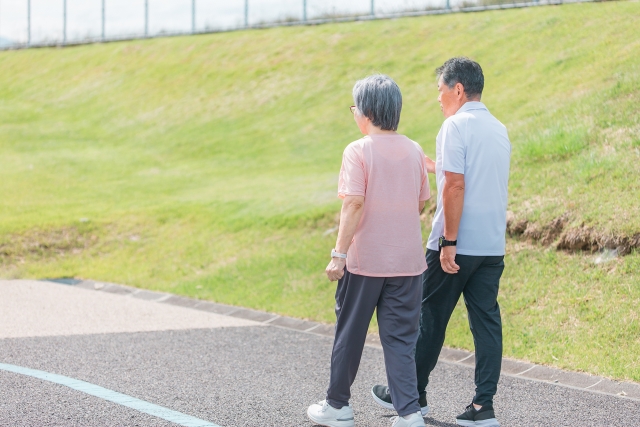
Avoid lack of exercise by engaging in regular activities like walking, stretching, and strength training.
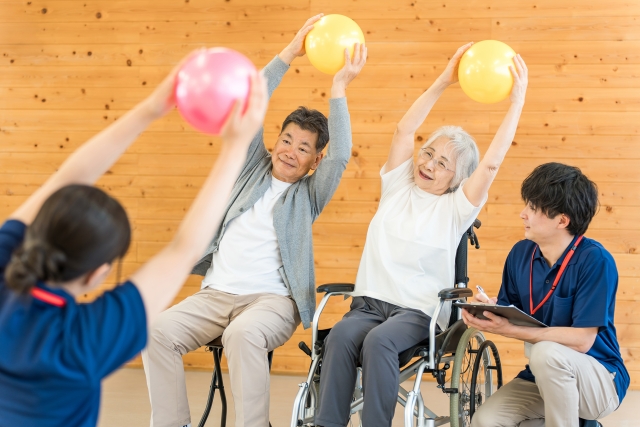
People tend to feel isolated if they have fewer opportunities for social interaction after retirement. Try to stay in touch with others by pursuing hobbies and participating in community activities. See if your local government provides information on clubs in your community.

Try going to bed and getting up at the same times each day. Avoid using your smartphone or drinking caffeinated beverages before bed to ensure you get quality sleep.
Get health examinations at regular interval.
Periodic health examinations are important because certain diseases have no subjective symptoms.
In addition to the health examinations and cancer screenings (see below) provided by your local government, take advantage of dental checkups, bone density tests, and cognitive assessments to ensure early detection and treatment of any disease.
Cancer screenings recommended by the Japanese government
| Type | Examination item | Eligible persons | Frequency |
|---|---|---|---|
| Stomach cancer screening | Questionnaire and stomach X-ray*1 or gastroendoscopy | Ages 50 and older | Once/two years |
| Colorectal cancer screening | Questionnaire and fecal occult blood test | Ages 40 and older | Once/year |
| Lung cancer screening | Questionnaire, chest X-ray, and sputum cytology*2 | Ages 40 and older | Once/year |
| Breast cancer screening*3 | Questionnaire and mammography | Ages 40 and older | Once/two years |
| Cervical cancer screening*4 | Questionnaire, visual inspection, cervical cytology, and pelvic examination | Ages 20 and older | Once/two years |
| Questionnaire, visual inspection, cervical cytology, and pelvic examination | Ages 30 and older | Once/two years | |
| Questionnaire, visual inspection, and HPV primary screening | Once/five years*5 |
- *1 For the time being, stomach X-ray exams are also available to those aged 40 and older and can be provided once a year.
- *2 Those eligible for sputum cytology must be aged 50 or older with a smoking index (i.e., cigarettes smoked per day × years) of 600 or higher.
- *3 It is not recommended to perform visual inspection or palpation alone.
- *4 Check the examination items provided by your local government.
- *5 Those at high risk should be examined once again one year later.
- (References)
- Ministry of Health, Labour and Welfare, "Cancer Screenings"
- Ministry of Health, Labour and Welfare, "Cancer Prevention Health Education and Cancer Screening Guidelines"
- Ministry of Health, Labour and Welfare, "Manual for Cancer Screening in the Workplace"
Staying healthy after retirement
How you manage your health after retirement has a major impact on your future health. Try to understand your age-specific risks and maintain appropriate lifestyle habits.
It's important to maintain your health in ways that work for you by taking advantage of health examinations and other health activities.
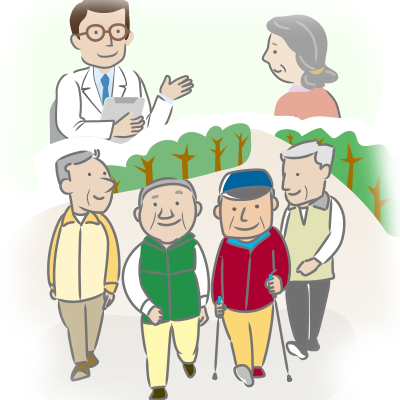
The health activities for which you are eligible after retirement depend on your health insurance. Refer to the linked page below for information on health insurance after retirement.
- Reference link









